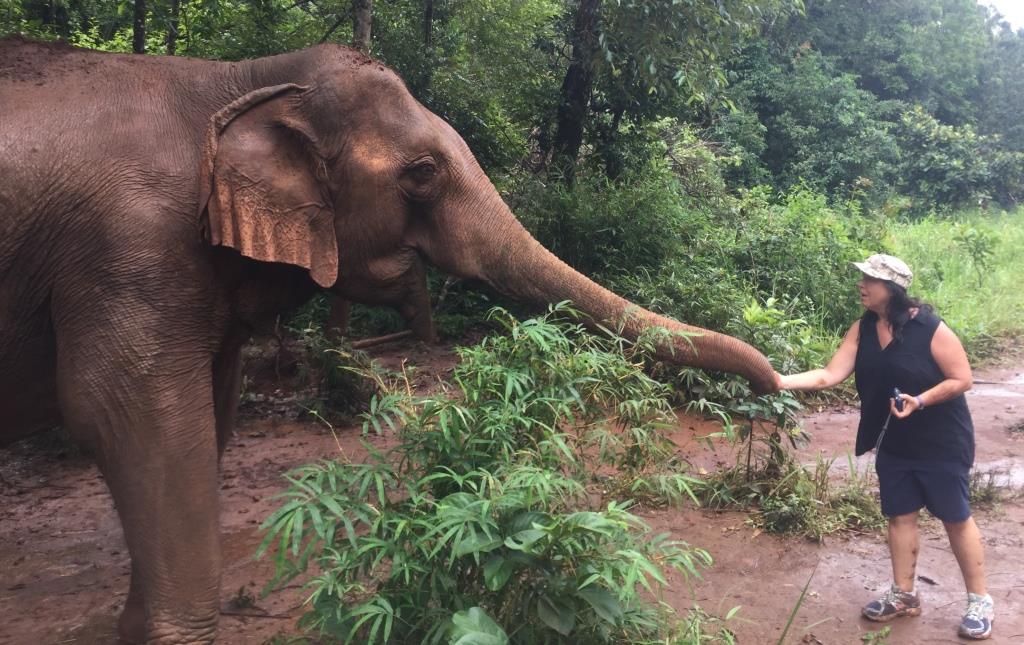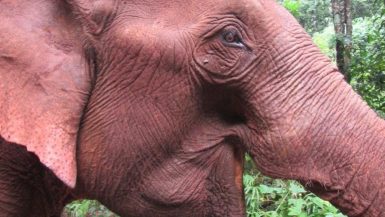We love elephants. One of our best travel days ever was in Chang Mai, Thailand, caring for some. So when we found out Cambodia has elephant rescue NGO’s helping these gentle giants live in natural forests, we were ready to go to any lengths to see them. Turns out those are pretty long lengths indeed. Welcome to Sean Monourom in Mondulkiri province in Eastern Cambodia.
Our Journey started in Siem Reap as we said goodbye to the wonders that are Angkor Wat and the temples at Bayon an Tha Prohm. We had three choices to get here, a 14 hour night bus, a 5 hour bus to Phnom Phen – then having to find another 6 hour bus to the Mondulkiri Elephants and not knowing how long that would take, or a private taxi that takes 10 hours.
We chose the private taxi. I know it was the fastest way we could get here because I am pretty sure our driver used to race in NASCAR. Cambodia roads are two-ish lane roads, one lane for each direction, that are mostly paved but full of all the loose gravel, potholes and muddy spots you’d expect where “monsoon” is one of the seasons. They are shared by chickens, dogs, cows, people, mopeds, motorcycles, cars, trucks, tuk tuks, semis, farm tractors, and a variety of small 125cc motorcycles hauling impossibly large loads on trailers (as in 6 dining room tables on some and many with 25-30 double pane house windows). There are also minibuses stuffed in ways you just don’t see in the States. Imagine a minibus with the back door opened high and a moped tied flat to the rear bumper with bags of fruit stacked up on the moped up to the open hatchback and at least 12 passengers inside wedged between bags of all kinds. All of these randomly appear on the road like you are in a crowded fish tank, and everyone just sort of squeezes in and flows around to keep moving forward.
None of our road companions are nearly fast enough for our driver, so we are constantly passing coming straight into oncoming traffic at 120-130 kilometers an hour, with about three chickens distance between us and the truck ahead when we whip into oncoming lanes to pass, using the horn liberally to let all know we are coming through.
In Cambodia the rule is size wins. Dogs are everywhere, and they know to run when they hear the horn. If we see mopeds ahead either on our side or coming at us, the driver just hits the horn and they dive to the edge as we zip by. Trucks ahead, we do the diving back into our lane. For cars and pickups, we often just ride the center divide and plowed on, three wide in the pass. By late afternoon the monsoon season kicked in and we add rain and wet roads to the mix. Kim told the driver she wants to live and he needs to slow down. We know fear. We make the 10 hour drive to Mondulkiri in 9 hours.
Thankfully, there is plenty to distract you from actually looking ahead. The countryside is gorgeous. Lush green as far as the eye can see. Rice paddies, banana tree groves, rubber tree farms, black pepper plantations, and forests of teak, strangling figs, bamboo and so much more I’ll never be able to name. Small villages were everywhere. Houses range from tin-roof shacks to modern stucco creations, but most are built on wooden stilts and made with some combination of tin, brick and wood. People man their small shops, some stuffed with a rainbow of clothing, wedged alongside roadside stands selling drinks, fruit, cooked meats, or vegetables to the school of traffic floating by. Many places sell gas to mopeds from liquor or liter water bottles stacked in white wire racks.
There are red bananas at many stands, which we haven’t seen before. Tanner wonders if the red banana are immune to the diseases hitting the Dole crops in Ecuador and whether that variety might provide some salvation if we lose more of the yellow bananas. I am reminded daily just what kind of education he is getting and feeling blessed we have the chance to spend our days pondering whether Eastern Cambodia might hold the key to saving your breakfast in the years to come. The elephants of Mondulkiri love bananas too, and we have made it safely to their forests. More on them in a future post.
Another length we have gone to in traveling is in redefining our standards of accommodation. When Kimberly and I traveled the World on our honeymoon, we stretched every dollar, and got used to accommodations that were mostly one star if you were generous. This time out in the World, our goal isn’t the Four Seasons, but clean, comfortable rooms, air conditioning and beds slightly softer than a palm frond mat on a wooden floor. For the most part, we have succeeded, and have really enjoyed some beautiful places, like the family-run Nakia Resort in Taveuni, Fiji and the Angkor Palace Resort in Siem Reap, a beautiful place with super friendly staff that cost only about 25% as much as hotels by NeoTract’s offices. But if you want elephants, your choices are more limited.
Most of the trekking outfits in Sean Monourom offer rustic choices, such as hammocks with mosquito nets strung in an open barn type hut with an outhouse. Beautiful valley views and as close to nature as it comes, but I am proud to be old enough to appreciate more refinement it if I can find it. We landed at a small guest house in town, with a super nice family running it. It had A/C and a generator to cover the frequent power outages, but what it offered in charm it lacked in cleanliness. When you’re trying to wash up and the only soap is reaching for a small bar in a dirty shower, and you rate towels not as clean or dirty but as shades of brownish white, it is easy to get a little homesick for Pleasanton and our beautiful house we rented out to friends. There were also flip flops in the room, left as a courtesy to wear, that were faded and worn. They have been on 100 other feet. But when our own shoes are caked with mud, we find ourselves grateful for something cleaner than the floor.
We wouldn’t trade this journey for anything, but sometimes it is important to know that if you really want to see the World, you will need to go to great lengths to get there and to graciously and gladly accept whatever comes your way.




I loved this story, and can just hear your grandma in my ear, laughing and laughing and coming back with stories of her own of crazy drivers and hole-in-the-floor toilets and having the time of her life, just as you are. I can’t wait to hear more about the elephants, as they are near and dear to my heart as well!